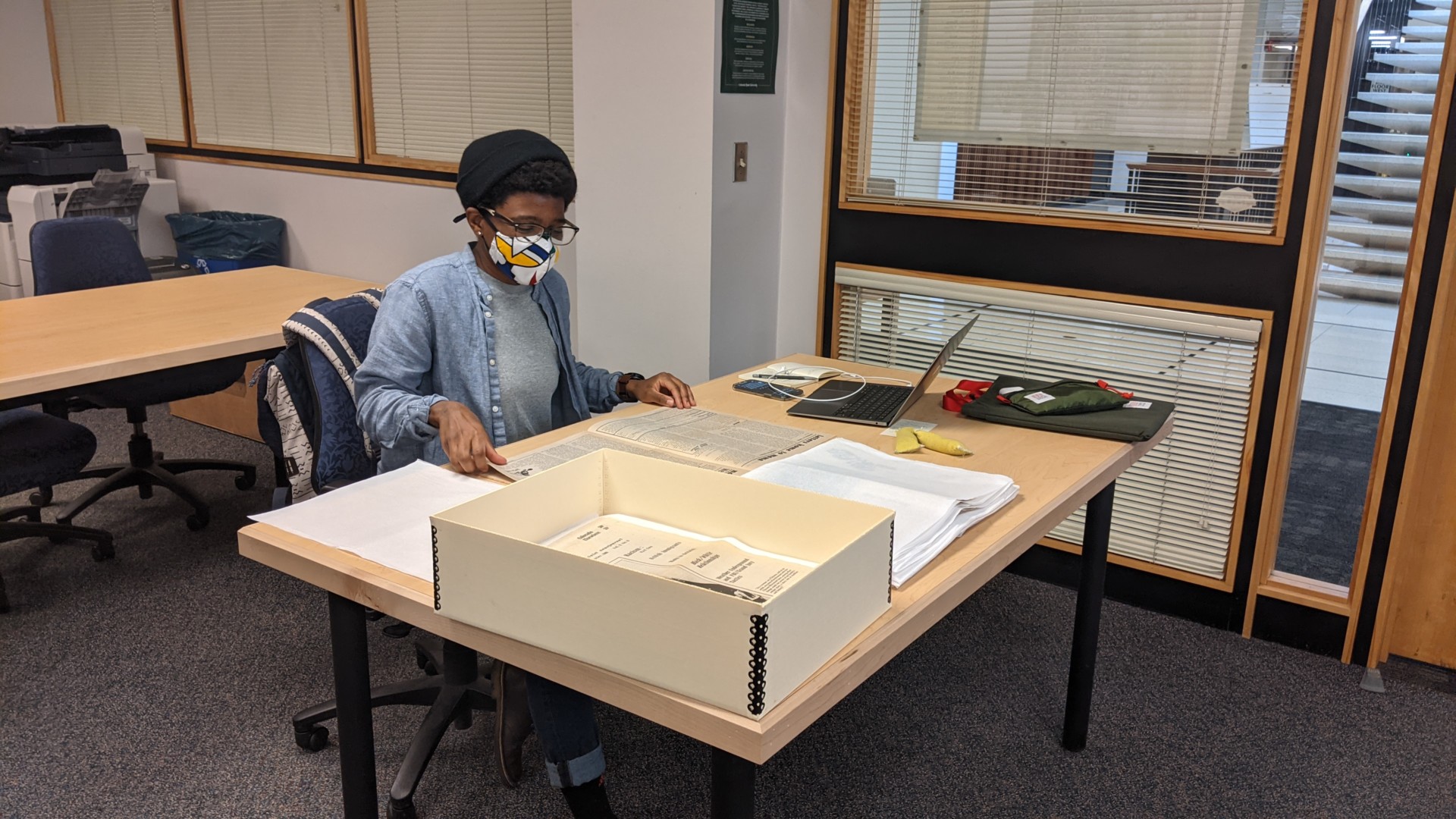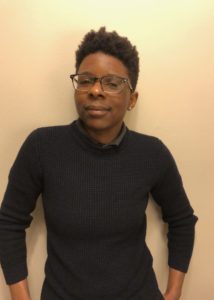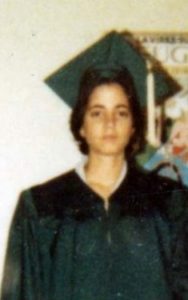
Kianna Middleton looks over items in the Friedman collection during a visit over the summer. She will deliver a presentation about her findings on Thursday, Sept. 16, at 11 a.m.
Nearly 40 years after her murder, June Friedman’s memory is still alive and inspiring the next generation of feminists at Colorado State University.
The Friedman Feminist Press Collection is the largest of its kind in the Rocky Mountain West. It contains many of the works of fiction, poetry, memoirs and essays that Friedman and her friends in CSU’s Feminist Group would read in the basement of the Lory Student Center in the late 1970s and early 1980s.
A $1,500 grant allows researchers to travel and study the collection. Kianna Middleton, an assistant professor of ethnic studies at the University of California San Diego, is the first recipient. She came to Fort Collins in June to study the collection, and will deliver a presentation on what it taught her about Black feminist writers on Thursday, Sept. 16, at 11 a.m.
How to watch the presentation
Who: Kianna Middleton, assistant professor of ethnic studies at the University of California San Diego
What: A presentation on her work with the Friedman Feminist Press Collection at the Morgan Library.
When: Thursday, Sept. 16 from 11 a.m. to 12:15 p.m.
Parallels between then and now
The stories of the women whose work is featured in the Friedman collection still feel familiar today.

“I find, personally, a lot of parallels between the second wave of feminism and now,” Middleton said. “We’re talking about women of color and feminism, kind of this isolation from the wider feminist movement. I think we’re seeing echoes of that happen with large feminist issues.
“For instance, with the abortion ban in Texas, I think that within the mainstream feminist movement there is rightful uproar about the ban, but perhaps without a critical understanding of how women of color and disabled women (of all races) have historically had to bear the brunt of restrictive reproductive laws and also compulsory sterilization.
“So, I sense tension between what might seem like a new fight for some feminists and a continued, underappreciated fight from marginalized women.”
Middleton studied the Friedman collection over the course of two weeks in June. She said that she also found parallels between what the Black feminist writers of the ’70s experienced and the world during the COVID-19 pandemic.
“There’s a sense of isolation and longing — of searching for the community,” Middleton said. “I think the pandemic right now and even before that … there’s a similar feeling in trying to find where one fits and their feminist politics and advocacy.”
Middleton said her presentation will look, in part, at the works of Black feminists poets who might not be as well known, and what happened to those writers.
This research was a continuation of Middleton’s time at CSU, where she earned her undergraduate degree in English and master’s in ethnic studies. The Fort Collins native moved to the Bay Area for her doctorate, and now works as a professor at the University of California in San Diego.
Middleton said her time at CSU was a big driver in how she came to approach being Black and being a feminist, and it will be a big focus of her presentation about the Friedman collection.
“I think one of the best things about this collection is June Friedman’s desire for women, for young feminists to learn more about feminism, to feel like they’re a part of a community, to stand up for whatever feminist causes they believe in, and I was interested in what the feminist history was at CSU,” Midleton said.
Who was June Friedman?
Friedman grew up in an urban area and came to CSU to study agronomy. This was rare for women at the time, but the 5-foot-2-inch scientist who regularly played pickup basketball games and ran up and down the stairs at the stadium to train for climbing Pikes Peak never backed down from a challenge.

“I really believe if she had lived, she would be part of what’s going on with women in agriculture today,” her friend Kayann Short said. “Women are going into those majors now, environmental science, trying to shift the whole idea of land and soil from competition-based ideas to collaborative-based ideas about how organisms work together.”
Short established the Friedman collection and was a fellow member of the Feminist Group. The group organized the first Take Back the Night March in Fort Collins in November 1979 and advocated for improved conditions for women students such as better lighting on campus and expanded curriculum.
They also helped take down CSU’s dorm-sponsored Playboy Club.
“We were going to demonstrate, but when the administration got word of that, they decided that it would not be held anymore, so we actually didn’t get to protest,” Short said. “We were kind of disappointed, but were really glad it didn’t go forward.”
After graduation, Friedman moved to a suburb of Denver to work in a soil lab. She was murdered in her apartment in 1982, at just 23 years old.
No arrests have been made to this day.
A dissertation turns into a memorial
After graduation, Short moved to Boulder to get her Ph.D. Her dissertation focused on the early days of feminist publishing, particularly from the late 1960s until 1981. She would write to various bookstores to get items that were out of print, and sometimes traveled across the country.
When Short finished her dissertation, she said she wanted to do something with all the books and magazines she had accrued, and CSU was a logical place to honor her friend June.
The collection started in 2013, and Short said she and other scholars have been adding to it since.
“It’s been 39 years since June died, and I thought it was important to establish an archive to keep this history in front of us, and also just the ideas,” Short said. “Obviously sexism hasn’t gone away, racism hasn’t gone away, homophobia hasn’t gone away.
“These are all things women were writing about in the ’70s and 80s, and it’s important to look back at how far we’ve come, and how far we need to go.”
How the collection can inspire the community
Mark Shelstad, the head of digital and archive services at the CSU libraries, said the Friedman Feminist Press Collection now contains 400 pieces of literature.
“One of the things I’m really fond of is a newspaper called the Big Mama Rag, which was published in Denver,” he said. “It also includes works by publishers such as Kitchen Table: Women of Color Press, Seal Press, Firebrand Press and others.”
Short said the collection is still growing, and contains many of the works that she and other women would share with one another during their time at CSU.
“A lot of these books were just informally circulating,” she said. “It was kind of an underground movement. Actually it was literally an underground movement because our office was in the basement of the student center.”
Some of the works in the Friedman collection have been digitized, and Shelstad that said other pieces are available in the reading room of the Morgan Library.
“I feel like, at least with this collection, it gives June’s memory a new life, in so many words,” Friedman’s twin sister Carrie Megan said. “I think it’s a wonderful thing, it makes me very, very happy to know that other people can use the collection, and it’s got meaning for them.”
One of those people is Middleton, who said she hopes her presentation makes the entire campus aware of the resource that’s available to them.
“All the things that June Friedman was involved in, the legacy of her own feminist activism at CSU, I’ll talk in my presentation about why this matters to me and how the campus led to the evolution of my own feminism,” Middleton said.